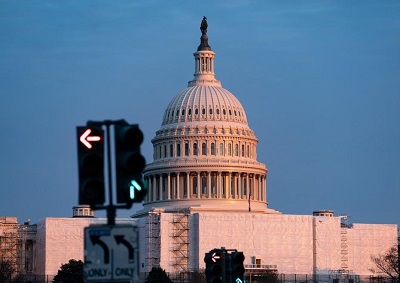Washington, (Asian independent) The US House of Representatives has passed a short-term spending bill that would extend government funding until March, a few hours after the bill was approved by the Senate, as funding for some federal agencies and programs is set to expire on Saturday.
The lower chamber of Congress passed the measure by a vote of 314-108 late Thursday amid opposition from hard-line House Republicans, who had attempted to cut federal spending and add border security provisions in the “clean” stopgap measure, reports Xinhua news agency.
The bill, which cleared the Senate earlier in the day by a tally of 77 to 18, will now be sent to President Joe Biden to be signed into law.
This is the third stopgap funding measure this Congress has approved, with the first in September 2023 and the second in November.
Former House Speaker Kevin McCarthy, a Republican, was unprecedentedly ousted from his post by conservative members of his own party after passing a “clean” short-term spending bill with the support of Democrats.
In November, McCarthy’s successor, House Speaker Mike Johnson worked with Democrats to approve another stopgap spending bill that would extend funding for some federal agencies and programs until January 19, 2024, and others through February 2.
Earlier this month, House and Senate leaders reached an agreement on a short-term spending deal that would move upcoming government funding deadlines to March 1 and 8, respectively, buying legislators more time to craft longer-term spending bills.
Just as McCarthy, Johnson is facing criticism from within the party, as hard-right House Republicans have been pressuring him to drop the spending deal he reached with the Democratic leadership.
Some Republican lawmakers even expressed regret for casting vote for Johnson’s speakership.
Maya MacGuineas, president of the Committee for Responsible Federal Budget, recently said in a statement that the stopgap spending bill will hopefully allow Congress to pass appropriations bills in the next few weeks before the continuing resolution runs out.
“Congress should now work to pass individual appropriations bills rather than a gigantic omnibus, which can often be accompanied by a slew of other debt-increasing provisions attached to it,” said MacGuineas.









